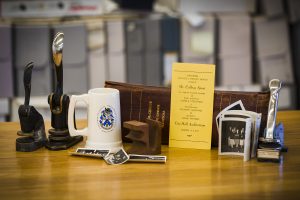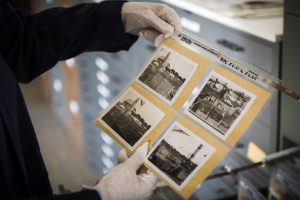This story originally appeared in the Summer 2018 issue of Clark Magazine.
“The past just won’t go away. It shows up in many places —street names, old letters, unpublished autobiographies, historical postcards, and formal historical writing. We know the past is important. It can be a source of inspiration and pride, regret and shame. It cannot be ignored. Unresolved historical trauma—personal or collective—troubles our present, demanding attention, resolution, and closure. Historical accomplishments, unfinished business … individual lives, and collective struggles may serve as moral exemplars to those searching for a compass in the disorder of the present. So a history that embraces all human possibility and seeks a full and satisfying account of the past is fundamental to healthy societies.”
– Tom Mitchell, University Archivist Emeritus
Documents, photographs, and the occasional artifact can all be found in Brandon University’s S.J. McKee Archives.
But while the tall, narrow stacks house material relevant to the University and its history, the McKee Archives are also home to records of import for the city of Brandon and much of southwestern Manitoba.
While many might think of an archives as a museum of sorts, that’s not an accurate interpretation.
“Archives, as institutions at least, exist to acquire, preserve, and make accessible records deemed to have enduring value,” said Brandon University Archivist Christy Henry. “The enduring value can be related to cultural or historical value, but it can also relate to accountability, or evidence, or social justice, or all kinds of things like that. So that’s basically what an archives, as an institution, exists to do.”
And in this day and age, when citizens around the world are demanding transparency and responsibility from their political leaders, it’s interesting to note it was that same expectation that led to the creation of archives in the first place.
“The modern archives date back to the French Revolution because the peasants, one of the things they wanted was access to government records to see what the government was doing with the money—accountability and stuff like that,” Henry said. “Archives, in some ways, are foundational to democracy. It makes things transparent—it allows you to see what’s happening.”

The S.J. McKee Archives, like Brandon University and Brandon College before it, has an intriguing history of its own.
It began in the mid-1970s, when journalist and local historian Fred McGuinness and Reg Forbes, Principal of the Agricultural Extension Centre in Brandon, convinced Pool Elevators to place their records at Brandon University and fund the creation of the Rural Resource Centre. When that entity became the BU Archives in the early 1980s, Eileen McFadden, the first professional librarian at Brandon College, became its first archivist. The archives was named after S.J. McKee in 1991 when his papers were donated to the institution.
Archivist Emeritus Tom Mitchell said that McKee, who had been teaching at Woodstock College in Ontario, came west when Prairie College was established in Rapid City as a Baptist seminary.
“Prairie College shut down, S.J. stayed, set up the Rapid City Academy, moved it to Brandon in 1891, and the Rapid City Academy — the McKee Academy — became Brandon College in 1899,” said Mitchell, who became University Archivist in 1996. “It was a big deal. So everyone who’s ever attended Brandon College and Brandon University owes a tremendous debt of gratitude to S.J. McKee.”
While things have certainly changed at the McKee Archives over its 35-year history, one thing that remains the same is the struggle for adequate space and resources. Because the research component of archiving materials can be challenging and time-consuming there’s much more work than can be accomplished by a single archivist. And Henry is the only one in Brandon.
“The challenge in describing archival records is they are unlike books, which will come with a title and an author and a table of contents and maybe an index,” Henry said. “We will literally just be handed a box of negatives. So you have to figure out, what is it? What is the history of the negative?”
When collections, such as those of renowned Brandon photographer Lawrence Stuckey, are donated to the archives, that sets in motion a whole chain of events — applying for a grant in order to hire someone to process and catalogue each item. And that sort of work can take six or seven years.
“It can be overwhelming,” Henry said. “But at the same time, whenever a new collection comes in, we get excited. What is there? Who are we going to tell about it? And there’s a lot of satisfaction when people come into the archives and you’re able to help them find the thing that they’re looking for. I think at the root of it, we are passionate—we believe in the work. We believe that the work is necessary.”
Funding is always an issue, and Henry said there are fewer external resources available now than there were when she took over from Mitchell in 2011. The National Archives Development Program was cut in 2012, and while it’s been revived to some extent, university archives are no longer eligible for its grants.
One might think the advent of more modern methodology helps streamline the archival process — and it does — but it also creates an entirely new workflow that takes additional time.
“Technology has both sort of hindered and sort of expanded the work,” Henry said. “It’s a good and a bad thing. Technology — digital records — a great deal more effort has to be put into preserving them. And we’re not just saying for five years or 10 years or even our life span. We’re talking hundreds of years.
“But what it does do is get the archives to more people, because we have a website. So technology has increased access to the archives, but has also created extra demands on the profession. Digitizing things doesn’t eliminate the archival work. It’s another step. So as labor-intensive as the work is, digitizing adds extra layers to it, so it actually takes longer.”
Consequently, maintaining the archives now requires even more money and extra storage.
“And that’s an issue,” Henry said. “Each archives generally has a collecting mandate.
Our mandate is quite large because we started as a community archives and then became the University archives as well.”
While technology has some advantages, Henry said paper materials are probably the easiest items to care for. But certain conditions are essential for their preservation, and those are features the McKee Archives doesn’t have.
“We need a vault,” Mitchell said. “We’ve got no temperature and humidity control that are archival grade. So in terms of the progression of this place, that is pretty seminal.”
The good news is that the archives continues to grow as people donate materials, access records, and seek advice.
While space is an issue, both Henry and Mitchell enthusiastically encourage people, especially alumni, to keep contributing to the collection, and to extending the reach and ability of the archives to grow and improve.
Henry feels there’s a misconception that archives are only interested in very old photos and writings, such as those from the Second World War and earlier. But more recent records are also worthy.
“Stuff from the ’50s, the ’60s, the ’70s—people think, ‘Well, that’s just stuff from my life so nobody’s going to care about that,’” Henry said. “But those are archival material too.”
To that end, both she and Mitchell have purposely made themselves ultra-approachable and welcoming when people make inquiries.

“When somebody has the courage to pick up the phone and call the archives to say, ‘I’ve got this map,’ you have to be very receptive to people and appreciate their interest,” Mitchell said. “I’m really proud of the record of the S.J. McKee Archives in developing a profile, which Christy’s continuing to do, that invites people not only to donate material but to come here for advice and research materials.”
Both Mitchell’s and Henry’s experience and long-time connections to the community are invaluable when it comes to doing what they do so well.
“Being an archivist is kind of a life sentence in the sense that there are two kinds of control that an archivist has in a place like this,” Mitchell said. “Administrative control, so you’ve got a number on everything and you know where it is. But the other part is intellectual control. You need to know the content of the records, and that takes a very long time. So you cannot have archivists coming and going in archival institutions because they have no institutional memory.”
“It helps me a great deal, I think, that I’m from this community,” Henry said. “I’m a BU grad. I wasn’t born here but I was raised here from the age of two. My great-grandfather was on the board of
Brandon College. So I’m connected to the place, which I think helps. Not just in recognizing things but in being passionate about the history of the community.”
While the archives is essentially about collecting, preserving and filing information, Mitchell said verbal exchanges and the interactions between people are the most important part.
“What we’ve got is basically a kind of terrain for us to talk about the past with people, and help them get where they want, whether it’s trying to find a dead relative, or trying to figure out what a
photograph is about,” Mitchell said.
Records and artifacts from decades ago have a sort of “mystique” about them, Mitchell said. And they serve to connect the past with the present—and the future.
“What this place is is a big site of memory about things that are salient and important in the culture,” Mitchell said. “That’s what an archives is about. We’re a doorway into the past. We have
sites of memory that people can come and explore. And the more you think about that, the more you appreciate how important that is.”
To contact the S.J. McKee Archives, email HenryC@BrandonU.ca or call 204-727-9634.
Contact
- Brandon University
- communications@brandonu.ca
To receive any BU publication in an alternate format please contact Communications@BrandonU.ca
About BU
Success is built at Brandon University. Our growing, progressive campus welcomes a diverse and inclusive community that combines proud tradition with shared ambition. Through our excellence in teaching, research, and scholarship, we educate students to make a meaningful difference as engaged citizens and leaders. Join us at BrandonU.ca.